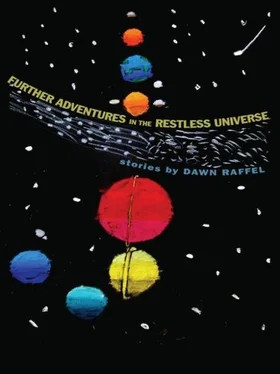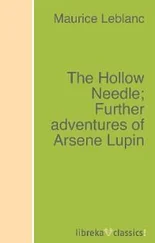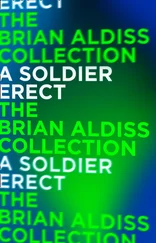“Listen,” he said.
He had a finger on the oscillator. Down in the cellar, under the rooms where we slept and we read and we ate and we sat and we looked at ourselves, he used Morse Code. Ham radio. The language of pressure.
“ The person to whom you are speaking,” he said, “can be anywhere at all.”
He asked me to practice.
“Why are you sorry now?” he said. “Couldn’t you pay attention to this?”

“You can pass,” my father says, “but you have to be quick. Caution causes accidents.”

My father and I had had a habit together of reading in the night. We would sit on my bed on top of the covers. The book was by a physicist, written the first time in between wars, world one and two, and later revised and later translated. We took turns aloud. We shared the illustrations, the drawings of phenomena, the waves and the charts, industrious particles, ink on white. “A child can understand, ” he said. I think I was eight. As best I recall, we did not make it much past the opening chapter, The Air and Its Relatives.
“See?” my father said, when we came to a stop. “Now you will not need to ask, why blue.”

The year it got too cold for school, my father says, he was sent on the train to an aunt in Chicago, two hours south, with nothing to do but fight with the boys with the stones along the tracks. Pipes froze. The Great Lake cracked. One day, my father says, he walked mile upon mile to that very same peninsula from which we had come, all the way out to that then-new attraction with two other boys, one of whom, my father says, would die in the war — shot out of the air, my father says — and one who could not, it turned out, afford admission. None of them entered. “ Fifteen degrees below zero, ” he says. “ You could feel the wind blowing deep in your bones. ”

“Shhh,” my mother said.
“Baloney,” he said.
She said, “People will hear you.”
The time had come to pray. The place was half empty, my father in between us.
Sins were recited.
I heard him shut the prayer book and stick it in the rack. “No such thing,” my father said. “There is no one in judgment.”
My mother said, “ What?”

Wonders and signs. Lake Forest, Waukegan, Gurnee, The City of Zion, Kenosha, Racine. North of Chicago are the towns we never enter, sights we skip. There is a lumberjack constructed out of something indestructible. Coffee and cheddar and cut-rate gas. A finger the size of a silo is pointing to gratification.
“Dad,” I say.
“I am hungry,” I say.
“Drive faster,” he says.

“Consider the speed, ” my father said, regarding an occurrence in stunning replication. The panel was plastic or something translucent.
“Sound,” my father said, “ is slow compared to light.”
I said, “Who could forget?” though I’d forgotten the gist.
People were leaving.
“Magnificent,” my father said. His clothes had grown loose as a result of the treatment for corrosion of the arteries. The jacket, I saw, was ruined in an elbow. “Didn’t we read about this?” he said.
“We could have,” I said.
“I think so,” I said.
The warning had been given.
“Refraction,” he said.
He wanted to linger. Me, I can’t bear to be anyplace, ever, so close to closing. I said that we must have, probably, learned this. I said we ought to go.
“Where do you think it went?” he said as I looked for an exit.
“Where do I think what went?” I said.
He said, “ That book, The Restless Universe .”

Deep into summer we ’d go to the lake. My father would look through a tube through a glass in the night at night. I would look at him look.
Our lake was black. Fish rose dead, silver and unseeable, and rotting by morning.
He offered the eyepiece to give me a chance. “ Magnetic ropes,” my father said, adjusting the view.
My mother gave a signal, a tap, a thump. It was a habit of hers. The operation had only recently succeeded; late in the night and in sleep he had been deaf, at least for practical intents.
“Inside,” she said.
Light smeared the world.
“Do you see it?” he said. “Aurora borealis.”
He put away the telescope and entered the tiny cottage we had rented.

Insides of rooms were the family business after the war. Recliners and sofas. Bedroom sets, dinettes, upholstered sectionals; the loveseat, the mattress, the headboard and side board, the tables for all purposes. Wood and glass, metal and varnish, quality foam. All manner of lamps with wall mounts included. Anything a body could conceivably require, with no money down, my father said.

“Lay off the horn,” my father says. The throughway is torn all to pieces en route to improvement.
“Nothing is moving at all,” I say.
We had seen the fish first, then walked out to view the firmament.
Exhaust fills the car.
I give it a tap, attempt a maneuver.
“No one is watching,” my father says. He is licking his fingers. The bag we are eating from leaks grease.

“Touch it,” he said. My father was showing me how to determine the value of a vanity. The show room was empty. “If you can poke your reflection,” he said, “if there isn’t any distance, you know that it ’s junk.”

“ You blinked, ” my father says. “ It was your own hesitation.”
“I’m sorry,” I say.
“No matter,” he says, surveying the damage. “At least it was nothing more than a taillight. Things sometimes break. ”

“Look for the streaks,” my father said. “Now do you see?” It was chilly outside, despite being summer.
“Sure,” I said.
“Do you?” he said.
Where we sat was up a hill, late at night. After a very long while, or maybe a short while, I would be older than my father was then.
“Where are you going?” my father said, and I could hear the water lapping.
In the book of the night, the man and woman sleep and oversleep until the night turns to evening. They wake to the dusk. The covers are tattered, shabby. The spine is worse for wear. Whole chapters are ragged, sticky, yellowed, and fragile from touch. The woman sighs. “We are not on the same page,” she says. The man does not hear, or else does not answer, as if he is someplace far from her. Significant objects fill up the bedroom: photos, keepsakes, the earrings on the dresser, the slip on the floor. These are cherished possessions indicative of character, personal quirks. “Must you?” he says. The dusk, the woman thinks, grows thicker as she rises. Outside the window the world is gone. Nevertheless, she is yanking on garments: skirt and blouse of salient label, the bracelet he gave her, clasping clasps. The man is still groggy and speaks through a yawn. “What is the conflict now?” he says. The woman turns. Space breaks between them. The phone starts to ring, and rings through a chapter. Neither one answers. He kindles the lamp. Paragraphs spill out unvoiced: Languid suspicions; an episode from childhood; a false sense of self; a shadow, if ever so faint, of hope. He watches her leaving, dressed for day. “You’ll be back,” he says, as if skipping ahead, as he sinks beneath covers.
Читать дальше




















